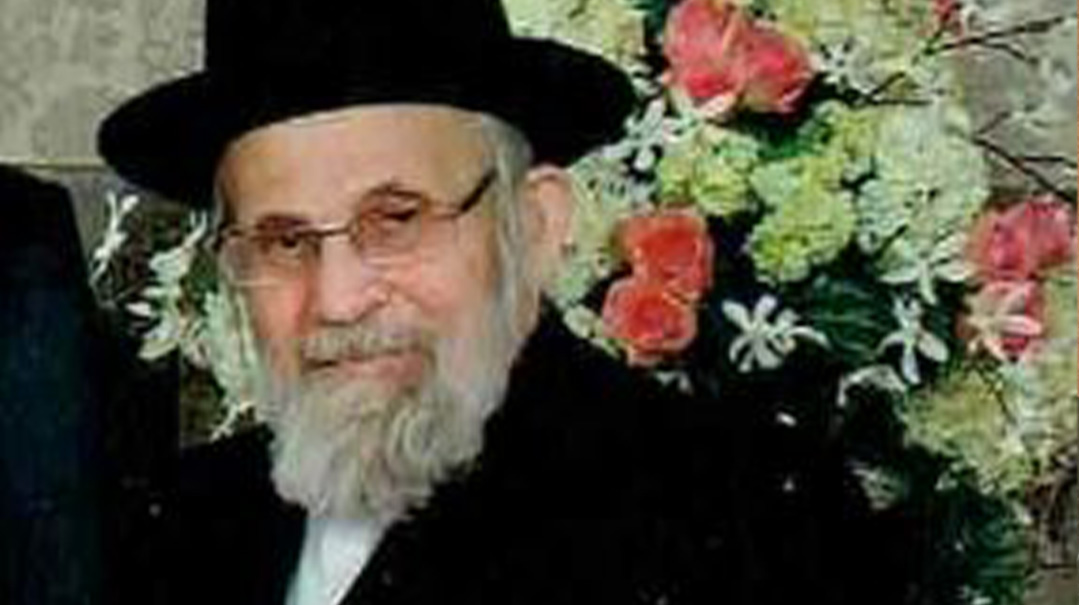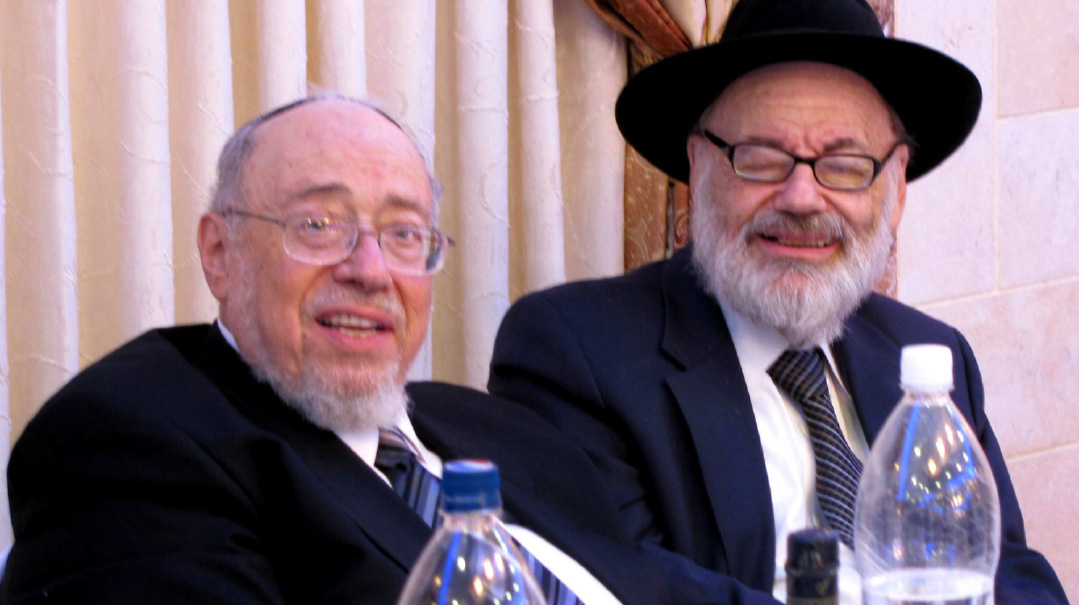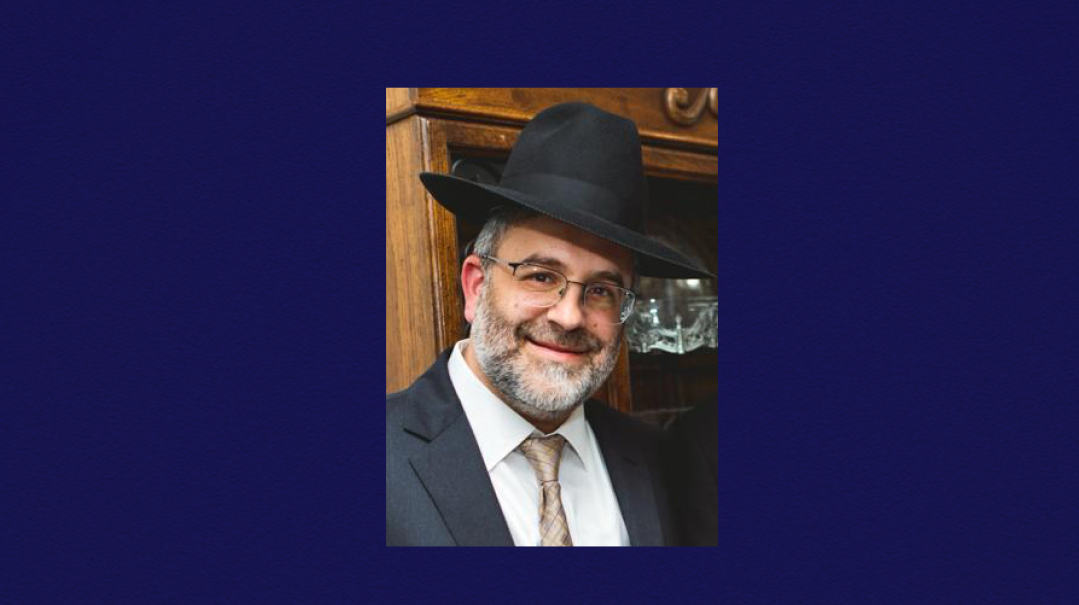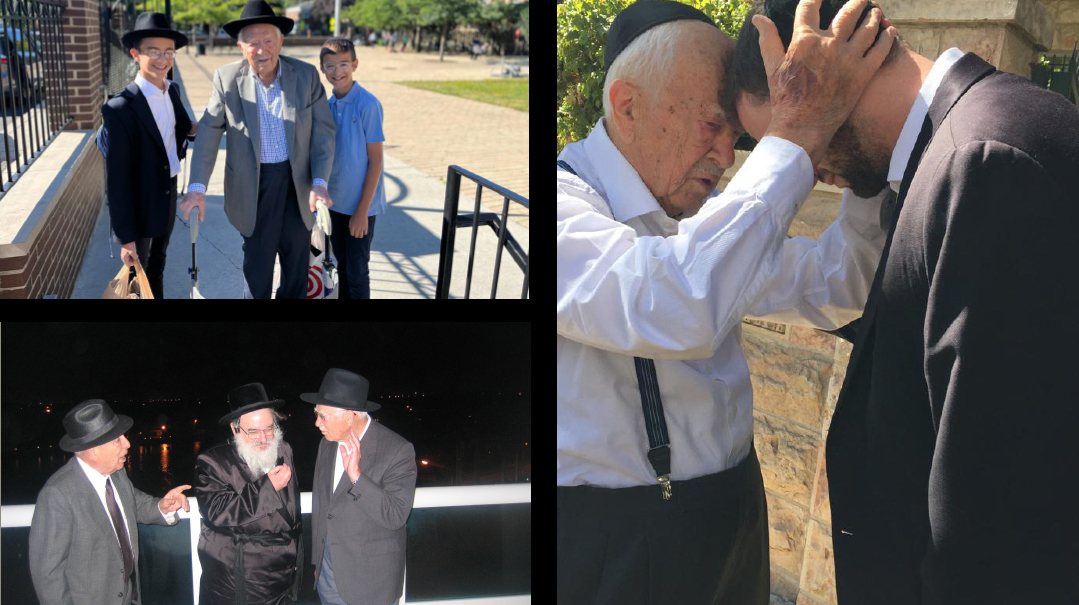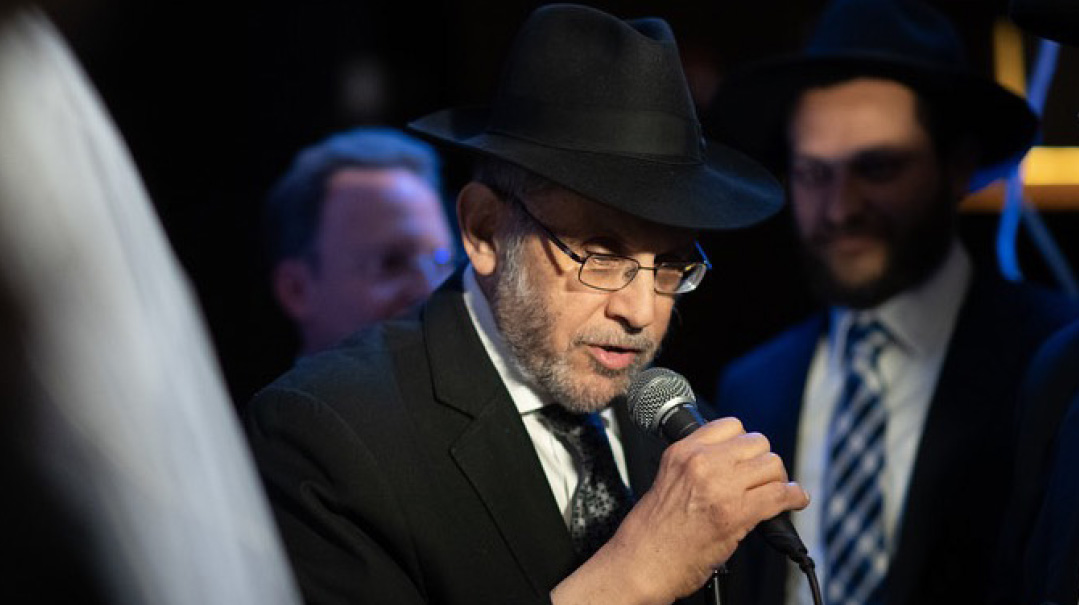Permission to Heal


He wouldn’t let the practical naysayers discourage him from a near-impossible dream: to build a medical center smack in the middle of Israel’s most densely populated chareidi city
Back in Zurich, people traveled from all over to Dr. Moshe Rothschild’s pediatric clinic. Yet when he moved to Bnei Brak and was the only physician around, he wouldn’t let the practical naysayers discourage him from a near-impossible dream: to build a medical center smack in the middle of Israel’s most densely-populated chareidi city
Monday evening, Chol Hamoed Succos, 5779, Bnei Brak. The extended Rothschild family — sons and daughters-in-law, grandchildren and great-grandchildren — had gathered in the large succah in the courtyard of their home at Rechov Elisha 20 for their traditional holiday celebration. Dr. Rothschild, father of 17, sat at the head of the table like a king. None of the family members knew that this was the last time they would gather with the beloved family patriarch.
Just a few hours later, early on Tuesday morning, Dr. Rothschild — with energy and health belying his 89 years and still involved in the medical center he founded 30 years ago in Bnei Brak — was injured in his home. He lost consciousness and was rushed in critical condition to the intensive care unit of Mayanei Hayeshua, the hospital he built from scratch to service the city’s chareidi population. This time, the man who was a constant, comforting presence for others had arrived as a patient.
That night, he was scheduled to be standing at the microphone in the large succah of the hospital courtyard for a Simchas Beis Hashoeivah. Instead, the crowd recited Tehillim for his recovery, while Rav Chaim Kanievsky paid his beloved physician a personal visit to his room.
On Friday morning, Dr. Rothschild’s condition deteriorated further. The bris of Dr. Rothschild’s newest great-grandchild — a grandson of his son Reb Shlomo, the director of the hospital — was scheduled for Shabbos morning, but preparations for the simchah were accompanied by a sense of dread.
Shabbos morning arrived, and Rav Chaim Kanievsky rose after a typical short night of sleep to daven vasikin. “I dreamed that Dr. Rothschild passed away,” he told a family member. Two hours later, at 7:30, Dr. Rothschild passed away.
“When our father opened the hospital, his goal was to provide Bnei Brak with its own top-notch medical center to service the local population,” a son told Mishpacha. “He never set out to change the lives of the medical staff, but in the presence of such a great man, any person’s life can be radically altered. As much as we knew our father, we never realized the scope of his influence on the doctors and nurses, and on just about everyone who came in contact with him.”
Not the Time
Dr. Moshe Rothschild was born in Zurich, Switzerland, in 1929. His father, Reb Yosef Rothschild, was a Jewish communal leader who emigrated from Germany to Switzerland during World War I, while his mother was the daughter of Rabbi Ernst Weil, a prominent Swiss Jewish figure. Moshe was one of ten children, nine of which were boys.
“My father owned a metal factory, but when World War II began and the Jews of Eastern Europe were on the verge of annihilation, my father locked the factory’s doors and announced, ‘This is not the time to make money. Our job now is to help our brethren who are suffering in captivity,’ ” Dr. Rothschild told Mishpacha in an interview several years ago. “Every day, he would come up with a new way to save Jews or a new idea for things to send to them, and he would recruit us boys to help him.”
After the war ended, the Rothschild family began workingon locating Jewish children who had been hidden in monasteries. Together with Rav Yosef Shlomo Kahaneman, the Ponevezher Rav, they made their way from one monastery to the next, seeking to retrieve the Jewish children who had been left in the clergy’s care.
The young Moshe Rothschild spent his years as a yeshivah bochur in Montreux, near Geneva, where he had the privilege of learning under two renowned Torah luminaries: Rav Moshe Soloveichik and Rav Aharon Leib Steinman, who spent the war years there together.
It was during those years that Dr. Rothschild first developed a relationship with Rav Steinman, but it was a connection that would last for many years to come. For over four decades, Dr. Rothschild would visit Rav Steinman’s home every Friday night before returning to his own family, in order to wish the Rosh Yeshivah a good Shabbos and to verify that he was in good health.
After his years in yeshivah, Dr. Rothschild studied medicine in Zurich for six years and in France for one more year, specializing in pediatrics and family medicine. But even while he was busy with his studies, he found time for communal leadership. In Paris, there was an active Jewish community led by Rav Elie Munk, and the young medical student was asked to fill in for the rav for a period of three months while he was away.
After completing his studies, Dr. Rothschild began searching for a place to do his residency. At the time though, there were not enough senior physicians available in Switzerland for the number of medical school graduates who were seeking to study under them. Dr. Rothschild tried his luck with the most famous Swiss doctor at the time, Dr. Guido Fanconi, who was already known for a number of medical discoveries that bore his name. Rothschild found himself vying with hundreds of other graduates for the single available slot, but in a stroke of Providence, the famed professor selected Rothschild from all the available candidates.
Before the appointment was confirmed though, Dr. Fanconi called in Moshe Rothschild to go over the rules. “I heard that you don’t work on the Sabbath. Well, I hope your rules will change when you work with me.” When Rothschild politely refused, the doctor, caught be surprise, said, “Why not? Can’t you ask your rabbis to allow you to work on the Sabbath for the sake of a position like this?’ Moshe replied, “Actually, no. I know it’s a tremendous privilege to have been chosen by you, but I would rather give up a thousand such opportunities rather than violate a single Shabbos.’ Fanconi was impressed. “If that’s the case,” he said, “they you’re accepted.”
In 1960, Dr. Rothschild married a young woman from Zurich named Rose Lang and opened a pediatric practice back in his native city, where he became a sought-after physician for both the Jewish and non-Jewish populations.
Why did you decide to build a hospital?
It was these great Torah scholars who told me to. They said, “You have to build a hospital, because you could save many lives.” I come from Switzerland; in Switzerland there is no city of over 20,000 residents with no hospital, and at that time there were 120,000 inhabitants in Bnei Brak. So they told me I should establish one.
People told me, “You’re crazy, you can’t do this!” And they were right, I was crazy, and I am crazy!
The first building opened its doors 27 years ago. We had 300 births in the first month. At the moment we have 40 births a day. So, we say “Mazel tov” 40 times a day at Mayanei Hayeshua.
Was there much resistance to establishing a hospital in Bnei Brak?
I had endless problems. But I had the backing of gedolei hador. Baruch HaShem, HaKadosh Baruch Hu has solutions for everything.
At first, the other hospitals argued that we didn’t need another hospital in Bnei Brak, and they put together a fund of $1 million to fight against us, to prevent us from taking away their patients. They thought I was going to be competition. But very soon they came to understand that I don’t compete with them, I complete them.
The Vision
Dr. Rothschild was running a thriving medical practice, so the offer came as a surprise: He was asked to take a month off and serve as a driver and companion for the Ponevezher Rav, who had traveled to Europe to raise funds for the yeshivah he’d established in Bnei Brak.
After a brief deliberation, Dr. Rothschild decided to leave his clinic for a month and accompany the Ponevezher Rav on his travels. “If not for that trip, I would not have become what I am today,” he asserted. “The time that I spent with the Rav left a deep imprint. We traveled all over Europe together, and I soaked up his influence everywhere we went.”
Ten years later, in the late 1960s, a small event brought on another life-altering change: Dr. Rothschild asked his rebbi, Rav Moshe Soloveitchik, about traveling to Japan for a large pediatric conference. Rav Soloveitchik, however, advised him not to go, but to travel instead to Israel and join Ponevezh’s Yarchei Kallah program in Bnei Brak. The night after he arrived, he was summoned to the masgiach, Rav Yechezkel Levenstein, who had a problem in his digestive tract.
“The only medicine I had with me was a bottle of drops for treating stomach aches in babies,” Dr. Rothschild remembered, “but as the Gemara says, the One Who commanded oil to burn can command vinegar to burn. The mashgiach felt better right away. I became close with him as a result, and he convinved me to move to Eretz Yisrael. Life in Switzerland was successful and productive, but I listened.”
The Rothschilds settled in Bnei Brak in 1970, but at the time, the 3-square mile town – flanked by Ramat Gan and Tel Aviv on one side and Petach Tikvah on the other, didn’t have much in the way of its own medical services. Dr. Rothschild made the daily commute from Bnei Brak to Jerusalem, where he worked at Shaare Zedek Medical Center. He was also a highly regarded mohel (over the years, he performed thousands of brissos throughout the world, including circumcisions for adult immigrants from the Soviet Union). And since he was the only doctor living in Bnei Brak at the time, the Rothschild home on Rechov Elisha virtually turned into a makeshift emergency room.
Dr. Rothschild, who had a large family of his own, never considered charging a fee for examining patients. Instead, the waiting room in his home contained a large box where donations could be deposited; those funds were later used toward the establishment of Mayanei Hayeshuah.
“My wife always knew when an adam gadol visited our clinic, even if she had never seen him before,” he related. “Every one of them, without exception, would step into the kitchen before they left, in order to express their appreciation to her.”
Sometimes on Shabbos, Dr. Rothschild would receive up to 100 patients in his home. But the record was set on the Yamim Noraim; on Rosh Hashanah and Yom Kippur, hundreds of people came to the unofficial urgent care center, where Dr. Rothschild worked entirely on his own. Some years he didn’t even have an opportunity to open his machzor, much less to daven with a minyan. It was difficult, exhausting, and frustrating. But what else could he do? He wouldn’t send people home without treating them, and he didn’t want them traveling to Beilinson hospital in nearby Petach Tikvah or to Tel Hashomer if it wasn’t absolutely necessary.
And so the years went by, as the sole chareidi doctor in this densely-populated chareidi enclave found himself overburdened with work. He had a dream, but when he spoke to his friends and colleagues about his vision, they didn’t know whether to laugh or cry — but they all agreed on one thing: It was a dream that was highly unlikely to be fulfilled. The hospitals in the State of Israel, by and large, were established either by the government or by the largest health fund in the country. There were a couple of medical centers in Jerusalem that were considered private institutions, but they had the strong backing of private donors. Opening a hospital is an extremely expensive proposition, and Dr. Moshe Rothschild was not a millionaire.
That was all true, but when a person has a drive to accomplish, and is armed with the brachos of the gedolei hador, even the most impossible goal can become a reality.
The Cornerstone Is Laid
The first step was to locate a plot of land where the hospital could be built. An orchard not far from Dr. Rothschild’s home was put up for sale, and the doctor viewed that as a stroke of Providence and made an offer.
In Kislev of the year 5739, the cornerstone of Maayanei HaYeshuah Hospital was laid,, the ceremony launching a global fundraising campaign.
The cost of the initiative was eight million dollars, and Dr. Rothschild managed to raise the entire sum himself. The first million was donated by the famed philanthropist Reb Yehoshua Frishwasser, the father of the well-known Frishwasser brothers of London, whose name served as the basis of the name of the hospital. (The “wasser” – or “water” – in his last name was the basis of the word “maayanei,” while his first name, Yehoshua, became “yeshuah.”)
Another major donation was received from the Lubavitcher Rebbe. The Rebbe was deeply impressed with the doctor’s vision and immediately handed the doctor a blank check, instructing him to fill in any sum that he chose. Dr. Rothschild wrote in the sum of one thousand dollars, which was quite a large amount of money at the time. The Rebbe also offered his blessing and advised him to call the institution a “beit refuah” (medical center) rather than a “beit cholim” (hospital). He explained that the name could have an impact on the state of mind of the patients; instead of feeling that they were in an institution for people who are sick, they should remember that the purpose of the place was to heal them from their illnesses. Of course, Dr. Rothschild followed the Rebbe’s advice.
Considering the pace at which the funds were being raised, Dr. Rothschild anticipated that it could take many years for the construction of the hospital to be completed. His research revealed that it would be less expensive for him to purchase the cranes and other equipment that would be used in the course of the hospital’s construction, rather than renting them on a monthly basis as was customary. He made a special trip to Italy to purchase the equipment, and after the construction was finished, he sold the machinery. He also visited various hospitals throughout the world in order to learn about the latest designs and techniques for the construction of a medical center.
The hospital was inaugurated twelve years later, in 5750. The first department to be opened was the maternity ward, with other departments opening in subsequent years. And Maayanei HaYeshuah was not Dr. Rothschild’s final initiative; just two years ago, he founded a psychiatric hospital called Marbeh Daas. This institution was the result of an enormous investment of resources in the effort to provide a discreet, highly professional response to the needs of chareidi patients, for whom there was no other fitting institution.
Open Door Policy
Even after Dr. Rothschild returned home at the end of a long week, he could always expect a wide range of emergencies to come his way. A child may have sprained his elbow, and another may have ingested a foreign object. Dr. Rothschild never turned anyone away. He left the Shabbos table whenever there was a knock on the door, but he made sure to bring one of his children along to carry his medical equipment for every house call; the doctor himself refrained from carrying on Shabbos. During his visit to the family in need – which could last anywhere from five minutes to an hour – the child received a short period of concentrated quality time with the busiest father in the city. In light of the proliferation of such incidents, all of the children in the family had their turns fairly frequently.
In the first years after the hospital was established, Dr. Rothschild made a habit of visiting the hospital every Shabbos in order to recite Kiddush in each of the wards. He would arrive shortly after vasikin, accompanied by his children, and would make his way from one ward to the next. He also served as the baal tokea on Rosh Hashanah, and he led the Seder on the first night of Pesach, with each of his children accompanying him in turn.
Dr. Rothschild’s wife also played an active role in his acts of chessed within the confines of his hospital. Since the hospital first opened, she dedicated three hours every evening to visiting the hospital, where she helped feed the female patients who had difficulty eating on their own, inquired after the well-being of the family members visiting their loved ones, and assisted women who arrived to give birth and had no family members of their own to accompany them.
For many long years, Dr. Rothschild also served as the personal physician of many gedolim, whom he visited regularly, with his children accompanying him on a rotating basis. That was how the children of the Rothschild family had the privilege of visiting the Baba Sali in Netivot, the Steipler and Rav Shmuel Rozovsky in Bnei Brak, and many other Torah giants. The greatest privilege experienced by the Rothschild children – and, in later years, Dr. Rothschild’s grandchildren – took place at familysimchos: a large table was set aside for the gedolim who attended the event in order to express their gratitude to the dedicated doctor.
A Dedicated Father
“I may be dreaming, but I am not sleeping.”
This remark, attributed to the Ponovezher Rav, was a guiding principle in Dr. Rothschild’s life. This attitude enabled him to accomplish the impossible – establishing a hospital in the city of Bnei Brak with his own hands, while still caring for each of his 17 children with such devotion that each of them could have imagined that he was an only child.
“We never felt deprived in any way,” the grieving children told Mishpacha after their father’s passing. “Our father was always particular to give each of us quality time, as well as to spend time together with the entire family. He davened vasikin every day, and then he would come home and send us off to school while personally preparing our breakfasts. In the afternoons, when we returned from school, he would come home to have lunch with us, and he would join us at the supper table as well. The meals were short, but there was never a time when he did not join us.
“Every Shabbos, he reviewed every child’s learning with him,” they continued. “He never missed a parent-teacher conference. and would give out prizes that he had acquired during his many trips abroad.”
“He always found time to learn, and he was a talmid chacham in the fullest sense. He valued Torah above anything else, and even though he worked as a doctor, his greatest desire in life was to see all of us dedicating our own lives to learning. That was a wish that he was granted: All of his sons and sons-in-law went on to spend their lives learning, with virtually no involvement in any other matters.”
This was his joy, the realization of his deepest hope: the hospital was his passion, but children, grandchildren and great-grandchildren engaged in Torah and mitzvos was his essence.
His generations- and the generations of those born, helped and healed through the work of his hands, an army of zechusim accompanying the doctor to Gan Eden.
(Originally featured in Mishpacha, Issue 730)
Oops! We could not locate your form.






